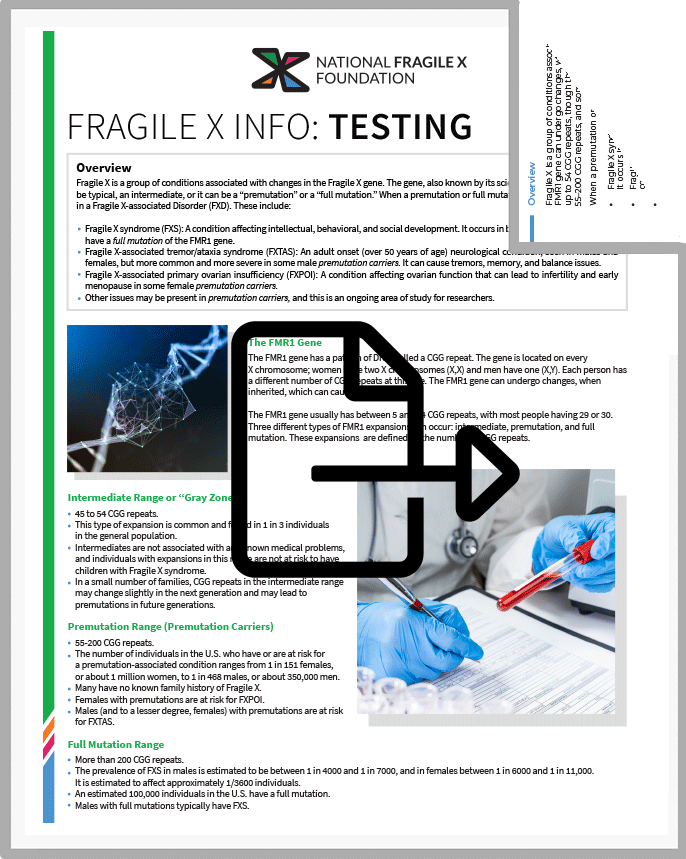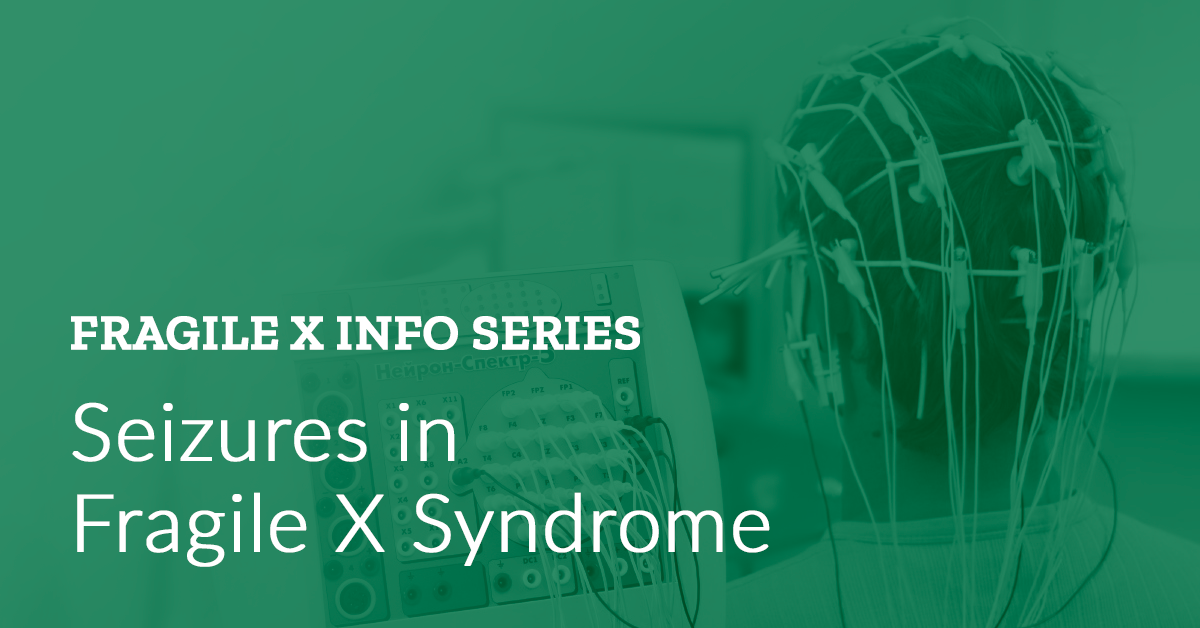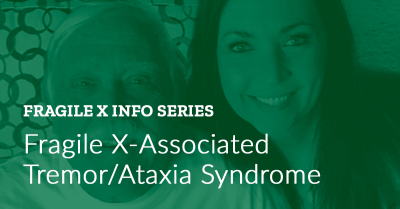Fragile X Info Series
overview of fragile x syndrome and associated disorders
Fragile X is a group of conditions associated with changes in the Fragile X gene. The gene (also known by its scientific name of “FMR1”) can be typical, or it can exhibit a “premutation” or a “full mutation.” When a premutation or full mutation is present, it can result in a Fragile X-associated disorder. These include:
FXS
FRAGILE X SYNDROME
FXS is an inherited disorder affecting intellectual, behavioral, and social development. It occurs in both males and females who have a full mutation of the FMR1 gene.
FXTAS
FRAGILE X-ASSOCIATED TREMOR/ATAXIA SYNDROME
FXTAS is an adult onset (over 50 years of age) neurological disorder, more common and more severe in males. It causes tremors, memory, and balance problems in those with a premutation of the FMR1 gene. (Both males and females who have a premutation are also referred to as “carriers.”)
FXPOI
FRAGILE X-ASSOCIATED PRIMARY OVARIAN INSUFFICIENCY
FXPOI is a condition affecting ovarian function that can lead to infertility and early menopause in some female carriers.
OTHER PREMUTATION CONDITIONS
Research is currently underway looking at various issues that may be seen in people with the premutation.
THE FMRI GENE
The FMR1 gene has a pattern of DNA, called a CGG repeat.
The gene is located on every X chromosome; women have two X chromosomes (X,X) and men have one (X,Y).
Each person has a different number of CGG repeats at this site.
The FMR1 gene can undergo changes, when inherited, which can cause these Fragile X disorders.
The FMR1 gene usually has between 5 and 44 CGG repeats, with most people having 29 or 30.
Three different types of FMR1 expansions can occur:
- Intermediate
- Premutation
- Full mutation
These expansions are defined by the number of CGG repeats.
LEARN MORE
ABOUT EACH BELOW
Ranges
Intermediate Range or “Gray Zone”
- 45 to 54 CGG repeats.
- This type of expansion is common and found in 1 in 3 individuals in the general population.
- Intermediates are not associated with any known medical problems, and individuals with expansions in this range are not at risk to have children with Fragile X syndrome.
- In a small number of families, CGG repeats in the intermediate range may change slightly in the next generation and may lead to premutations in future generations.
Premutation Range (Premutation Carriers)
- 55-200 CGG repeats.
- The number of individuals in the U.S. who have or are at risk for a premutation-associated condition ranges from 1 in 151 females, or about 1 million women, to 1 in 468 males, or about 350,000 men.
- Many have no known family history of Fragile X.
- Females with premutations are at risk for FXPOI.
- Males (and to a lesser degree, females) with premutations are at risk for FXTAS.
Full Mutation Range
- More than 200 CGG repeats.
- The prevalence of FXS in males is estimated to be between 1 in 4000 and 1 in 7000, and in females between 1 in 6000 and 1 in 11,000.
- An estimated 100,000 individuals in the U.S. have a full mutation.
- Males with full mutations typically have FXS.
- About half of females with full mutations have FXS. Others may have mild learning disabilities, anxiety, or shyness, or no obvious features of FXS.
- A full mutation causes the FMR1 gene to “turn off” and not work properly. This occurs by a process called methylation. This means the gene does not produce any or enough of the Fragile X protein, known as FMRP, which is believed to be necessary for brain development.
- A small number of individuals with FXS have what is called “mosaicism.” This means they have a mixture of cells with different CGG repeat numbers (full and premutation) and/or methylation status.
Testing
What Test Do I Ask For?
As for the FMR1 DNA test — also called the Fragile X DNA test. DNA testing detects more than 99% of individuals (both males and females) with FXS, as well as premutation carriers.
- Chromosomal microarray analysis is a powerful test for detecting certain genetic causes of developmental disabilities; however, it is not able to detect Fragile X mutations of any kind.
- AGG Interruptions – Talk to your doctor about testing for AGG interruptions, as some research shows they may make the FMR1 gene more stable at lower CGG repeats.
Learn more about AGG interruptions.
How Is Fragile X Syndrome Inherited?
Fragile X in an “X-linked” condition, which means that the gene is on the X chromosome. Since a woman has two X chromosomes, a woman with a premutation or full mutation has a 50% chance of passing on the X with the mutation in each pregnancy, and a 50% chance of passing on her typical X.
- If she has a premutation and it’s passed on (to either males or females), it can remain a premutation or it can expand to a full mutation.
- If she has a full mutation and it’s passed on (to either males or females), it will remain a full mutation.
Because males have only one X chromosome, fathers who carry the premutation will pass it on to all their daughters and none of their sons (they pass their Y chromosome on to their sons). There have been no reports of premutations that are passed from a father to his daughter expanding to a full mutation. This appears to only occur when passed from a mother to her children.
Who Is a Candidate for the FMR1 Test?
- Any male or female with intellectual disabilities, developmental delay, speech and language delay, autism, or learning disabilities of unknown cause.
- Any female with infertility, elevated FSH (follicle-stimulating hormone) levels, premature ovarian failure, primary ovarian insufficiency, or irregular menses.
- Any adult over 50 with features of FXTAS, including intention tremors, ataxia, memory loss, cognitive decline, or personality change, especially in combination with a positive family history of Fragile X.
- Any preconception or pregnant woman who expresses interest in or requests Fragile X carrier testing.
What Do My Test Results Mean?
- If you have results in the typical range, you are not at risk to have a child with FXS.
- If you have an intermediate (gray zone) result, you are not at risk to have a child with FXS. However, in future generations of your family, the CGG repeat may expand to the premutation range.
- If you have a premutation and you are male, all of your daughters will be premutation carriers. Your sons will receive your Y chromosome and will not be premutation carriers. You may be at risk to develop FXTAS.
- If you have a premutation and are female, you are at risk to have a child with FXS and are also at risk for infertility and early menopause (FXPOI), and to a lesser extent, FXTAS.
- If you have a full mutation and you are female, you may have physical or learning issues related to FXS. You are also at risk to have a child with FXS.
- If your son has a full mutation, he will likely exhibit some level of intellectual disability, including language or behavioral issues that will benefit from professional services, including special education.
- If your daughter has a full mutation, she is at risk for FXS or may exhibit only mild or no features of the condition.
How We Can Help
The NFXF is dedicated to serving the entire Fragile X community to live their best lives by providing the knowledge, resources, and tools, until, and even after more effective treatments and a cure are achieved. Learn more with Fragile X 101.
If you have questions please reach out to us at treatment@fragilex.org or call (800) 688-8765.


















